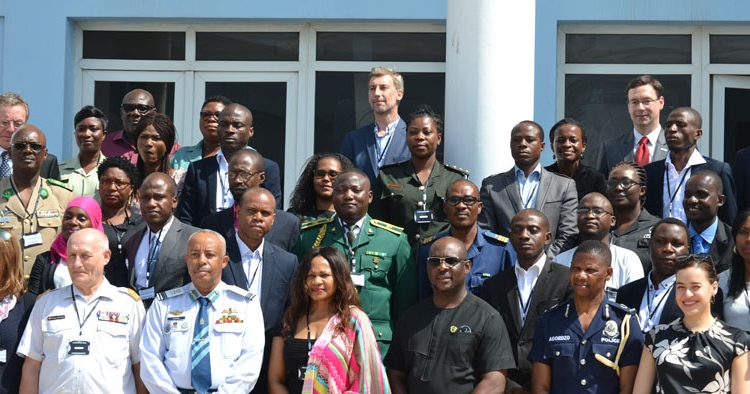A group photo of dignitaries and participants
Seji Saji, Deputy Director General of the National Disaster Management Organization (NADMO), has called for cooperation between Non-Governmental Organizations (NGOs) and state institutions to effectively address disasters.
Speaking at a two-week training organized for 25 participants from the sub-region on humanitarian assistance in West Africa on Monday at the Kofi Annan International Peacekeeping Training Centre (KAIPTC), Accra, he stated that the lack of cooperation by the actors often leads to duplication of duties.
“It is for this reason that it gladdens my heart that the 2015-2016 West Africa Disaster Preparedness Initiative (WADPI) championed by the United States Africa Command (USAFRICOM), which was co-hosted by KAIPTC and NADMO and Humanitarian Assistance for West Africa (HAWA) programme supported by the Austrian government equipped members of the Economic Community of West African States (ECOWAS) to develop framework to guide a smooth response to emergencies,” he indicated.
The course is jointly organized by the KAIPTC, Austrian Study Centre for Peace and Conflict Resolution (ASPR) with support from the Austrian Development Agency (ADA) and the Austrian Ministry of Defence and Sports (MOD).
It seeks to provide participants with thorough knowledge of the humanitarian sector.
It is also intended to enhance interaction and mutual understanding between civilians, police and military in West Africa.
Lack of funds due to weak West African economies, centralization of resources and poor infrastructure development are among the challenges impeding the movement of relief workers and logistics to victims during emergency situations, he indicated.
Mr Seji Saji called on ECOWAS and member states to ensure the socio-economic development of the sub-region to reduce poverty.
“There is the need for a multi-dimensional/sectoral approach to dealing with disaster response, reliable source of funding and joint training and simulation exercises by key players in the industry,” he mentioned.
Florence Iheme, Director for Social and Humanitarian Affairs of the ECOWAS Commission, averred that poverty and disease are some factors that affect the work of the commission.
According to her, “The region is confronted with an increasing number of challenges which constitute obstacles to integration and development, 233 million out of over 376 million people in the region live in extreme poverty, a population that is mostly vulnerable to the effects of widespread food insecurity, recurrent natural disasters, climate change and socio-political instability,” she noted.
Mrs Iheme reaffirmed the commission’s commitment to improving the living conditions of West Africans.
By Solomon Ofori


